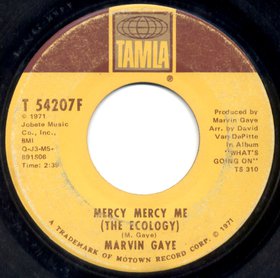
Mercy Mercy Me (The Ecology)
"Mercy Mercy Me (The Ecology)" is the second single from American singer-songwriter Marvin Gaye's 1971 album, What's Going On. Following the breakthrough of the title track's success, the song, written solely by Gaye, became regarded as one of popular music's most poignant anthems of sorrow regarding the environment. Led by Gaye playing piano, strings conducted by Paul Riser and David Van De Pitte, multi-tracking vocals from Gaye and the Andantes, multiple background instruments provided by the Funk Brothers and a leading sax solo by Wild Bill Moore, the song rose to number 4 on Billboard's Pop Singles chart and number one for two weeks on the R&B Singles charts on August 14 through to August 27, 1971.[1] The distinctive percussive sound heard on the track was a wood block struck by a rubber mallet, drenched in studio reverb.[2] The song also brought Gaye one of his rare appearances on the Adult Contemporary chart, where it peaked at number 34. In Canada, "Mercy Mercy Me" spent two weeks at number 9.[3]
"Mercy Mercy Me (The Ecology)"
"Sad Tomorrows"
June 10, 1971
March 1971
Hitsville U.S.A. (Studio A), Detroit
- 3:14 (LP version)
- 2:39 (7-inch version)
Marvin Gaye
Marvin Gaye
Cash Box described the song as being "a similar chugging ballad effort" to "What's Going On," stating that "the easy going surface lies gently above an exciting rhythm track."[4] Record World said that the song "couldn't be more perfect" and reflects how Gaye "developed a style uniquely his own."[5]
In 1991, a music video of the song was released by Motown Records, featuring appearances by celebrities such as Big Daddy Kane, Bobby Brown, Diana Ross, David Bowie and Wesley Snipes.[6]
As the single became his second million-seller from What's Going On, the album started on the soul album charts in the top five and began charging up the pop rankings. "Mercy Mercy Me (The Ecology)" soon became one of Gaye's most famous songs in his extensive catalogue. In 2002 it was his third single recording to win a "Grammy Hall of Fame" Award. As on "Inner City Blues", Bob Babbitt, not James Jamerson, plays the bass line.
B-side[edit]
The B-side, "Sad Tomorrows", was the early version of "Flying High". This song featured on the 40th-anniversary edition of the album. Lyrically, the songs are both the same except "Sad Tomorrows" is a quick two-minute snippet.